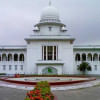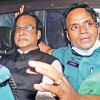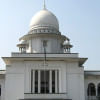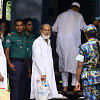War crimes appeals stuck for 17 months
The Supreme Court did not hear any of 20 war crimes-related appeals filed with its Appellate Division after disposing of the appeal of war criminal and Jamaat leader Mir Quasem Ali about one and a half years ago.
Nineteen of the appeals have been filed by convicted war criminals, and the other has been filed by the government.
The SC is not including the war crimes-related appeals in the hearing list, as the court is disposing of many other urgent cases, said a source in the SC.
More than a week is needed for completing hearing and disposing of just one war crimes-related appeal, and this court can settle a significant number of other cases by this time, the source said.
He added that there is also a shortage of judge in the apex court after retirement and death of a few of its judges.
There are now six judges against the posts of 11 judges at the SC's Appellate Division.
According to the source, appeals of high-profile convicted war criminals have already been resolved by the apex court.
The apex court completed proceedings of war criminal Quasem Ali's appeal on February 24 last year and upheld his death penalty on March 8 that year. He was executed on September 3 last year.
The International Crimes (Tribunals) Act-1973 was amended in February 2013, making a provision for disposing of appeals against the sentences in 60 days. This amendment raised the hope that the SC would quickly hear and dispose of such appeals and deliver judgments on them.
Attorney General Mahbubey Alam, however, said disposing of the war crimes-related appeals in 60 days was merely a directive, it was not mandatory.
The SC disposed of seven war criminals' appeals in the last four years. Six of them were awarded death penalty and they were later executed.
They are Jamaat-e-Islami leaders Abdul Quader Mollah, Muhammad Kamaruzzaman, Ali Ahsan Mohammad Mojaheed, Motiur Rahman Nizami and Mir Quasem Ali and BNP leader Salauddin Quader Chowdhury.
Delawar Hossain Sayedee, another war criminal and Jamaat leader, is now behind bars as the SC commuted his death sentence to jail until death.
Two war crimes tribunals have so far delivered 28 judgments. Fifty-three people were convicted and 31 of them were sentenced to death.
The Appellate Division is now set to hear and settle the appeal of convicted war criminal Mobarak Hossain. The defence and the state counsels, however, could not say specifically when the apex court would start hearing the appeal.
Contacted, Attorney General Mahbubey Alam and senior defence counsel Khandker Mahbub Hossain told The Daily Star that the chief justice has the authority to fix date for hearing any appeal by the apex court.
The attorney general, however, recently said he would move an application before the SC within a few days for hearing Mobarak's appeal.
On November 24, 2014, the International Crimes Tribunal-1 sentenced Mobarak, a former Awami League leader from Brahmanbaria, to death for abducting and killing 33 people in his district during the Liberation War in 1971. The tribunal also sentenced Mobarak to life imprisonment for another war crime and acquitted him of three other charges.
On December 18, 2014, Mobarak filed an appeal with the apex court, challenging the ICT-1 verdict.
Apart from Mobarak, Abdus Subhan, ATM Azharul Islam, Syed Mohammad Quasar, Mahidur Rahman, Forkan Mallik, Serajul Haque alias Siraj Master, Khan Akram Hossain, Obaidul Haque Taher, Ataur Rahman Nani, Shamsuddin Ahmed, SM Yousuf Ali, Shamsul Haque, Muhibur Rahman Boro Mia, Mujibur Rahman Angur Mia, Abdur Razzak, Shakhawat Hossain, Billal Hossain and Moslem Prodhan are the convicted war criminals who filed appeals with the apex court.
Two international crimes tribunals have convicted and sentenced them to death for committing crimes against humanity during the war in 1971.
Besides, the government submitted an appeal before the SC, seeking death penalty for former Jatiya Party lawmaker Abdul Jabbar, who is on the run. On February 24, 2015, the ICT-1 sentenced Jabbar to imprisonment until death in absentia for crimes against humanity.

 For all latest news, follow The Daily Star's Google News channel.
For all latest news, follow The Daily Star's Google News channel. 








Comments